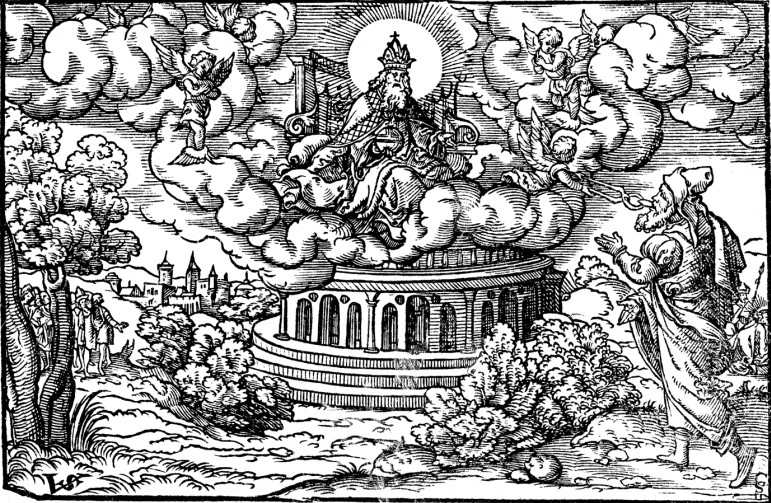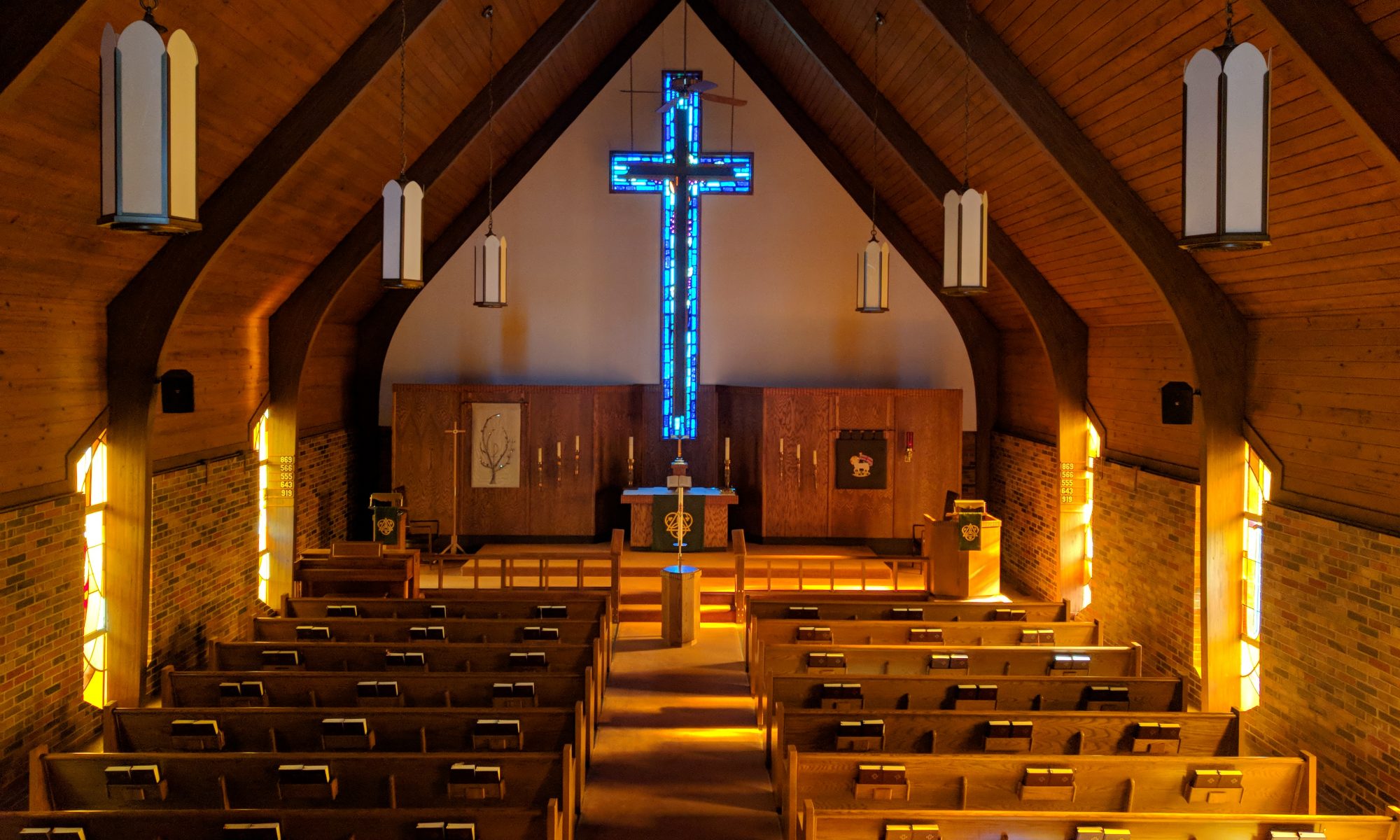
Lessons: Isaiah 6:1-7, Romans 11:33-36, John 3:1-17
Hymns: LSB 504, 953, 619, 768, 505
Grace, mercy, and peace to you from God our Father and our Lord and Savior, Jesus Christ. Amen.
Today is the Feast of the Holy Trinity. This day is distinct from other feasts of the Church Year. The other ones tell us of events that took place in time, revolving around the deeds of our Lord and Savior Jesus Christ. But on this day, we confess who our Triune God is—the Father, Son, and Holy Spirit. Three persons; one God. Not three Gods. Not one Person. Confusing? Yes! But our inability to comprehend the mystery of the Holy Trinity does not diminish who God is, how He reveals Himself to us, or what He has done for our salvation. Instead, we boldly confess who He is, as He has revealed Himself to us through the Sacred Scriptures.
The three ecumenical creeds are the confession of the Christian Church concerning the one true Triune God. Anyone who rejects the creeds cannot be counted as a faithful Christian (Those who find portions of the creeds questionable need to talk to their Pastor to learn why we confess what we confess). Unfortunately, in many churches, the creeds are confessed as mere historic custom; they are not understood as something faithful Christians must believe in. But when we confess these creeds, we do so, recognizing that they give a true explanation of God the Father who created us, God the Son who redeemed us, and God the Holy Spirit who sanctifies us.
If they were not true, we would not be wasting our time in this church confessing them. I want you to know, dear brothers and sisters in Christ, that we do not do things merely out of historic ritual or custom. Instead, we do what we do, confess what we confess, and teach what we teach because we believe we are being faithful to God the Holy Trinity in accordance with the Holy Bible.
Yet, you may have noticed a couple of challenging portions to the Athanasian Creed, which we always confess on Trinity Sunday. Concerning this Creed, Dr. Martin Luther stated, “I doubt whether the New Testament Church has a more important document since the Apostolic Age.” What he was saying is that, of all the things written after the New Testament was completed until his time, nothing was more important than the Athanasian Creed.
While this Creed is true and attempts to offer clarity concerning God the Father, God the Son, and God the Holy Spirit (especially with the relation between each of the Persons of the Trinity), there are some aspects of the Athanasian Creed that can be a little confusing. First, the word “catholic” is used. It is all lowercase. That means we are not referring to the denomination known as the Roman Catholic Church, but “catholic” in this sense means universal, or Christian. About half of the world’s Christians belong to Roman Catholic churches. The word “catholic” in today’s creed is a good Christian word that has lost meaning in English because of its strong association with the denomination. You could say the same about orthodox. To be orthodox could mean to be a member of the Eastern or Russian Orthodox churches, or it could mean that you are upholding the pure Word of God. “Evangelical” is another misunderstood word. It means Gospel, meaning we preach the Gospel, and our focus is on Christ. Our congregation is named Grace Evangelical Lutheran Church. Yet, many churches claim to be evangelical insist that you must be “born again” through a personal conversion experience. For them, the focus of being “born again” is on the individual. They generally do not baptize babies, for to them Baptism is nothing but an indication that they had some sort of personal conversion experience. About a quarter of the world’s Christians believe this. This is not what Jesus meant in today’s Gospel when He said you must be born again. Our new birth in the Spirit is the act of God through His Word and Baptism to convert sinners from spiritual death to spiritual life. As faithful Lutherans, we can certainly consider ourselves evangelical (not insisting on a personal conversion experience but that we preach the Gospel), catholic (not the denomination but Christians in Christ’s one apostolic church), and orthodox (not Eastern, but adhering to God’s truth).
Another area of confusion is when the Athanasian Creed says, “At His coming all people will rise again with their bodies and give an account concerning their own deeds. And those who have done good will enter into eternal life, and those who have done evil into eternal fire.” What? Doesn’t this speak against the fact that we are justified by grace through faith alone and not of our own works? My friends, this does not, in fact, contradict what we Lutherans believe, teach, and confess. In fact, it matches the words of Jesus, who said, “Do not marvel at this, for an hour is coming when all who are in the tombs will hear his voice and come out, those who have done good to the resurrection of life, and those who have done evil to the resurrection of judgment” (John 5:28-29). This language is echoed in St. Paul’s important letter to the Romans. In that epistle, God the Holy Spirit inspired the apostle to write such important, grace-filled words as, “The wages of sin is death, but the free gift of God is eternal life in Christ Jesus our Lord” (Rom. 6:23) and “For we hold that one is justified by faith apart from works of the law” (Rom. 3:28) and “For all have sinned and fall short of the glory of God, and are justified by his grace as a gift, through the redemption that is in Christ Jesus, whom God put forward as a propitiation by his blood, to be received by faith” (Rom. 3:23-25). Yet, Romans 2:6-11 declares, God “will render to each one according to his works: to those who by patience in well-doing seek for glory and honor and immortality, he will give eternal life; but for those who are self-seeking and do not obey the truth, but obey unrighteousness, there will be wrath and fury. There will be tribulation and distress for every human being who does evil, the Jew first and also the Greek, but glory and honor and peace for everyone who does good.” Is Paul contradicting himself? Or, since God the Holy Spirit inspired Paul to write what he wrote, is God contradicting himself? Certainly not!
What do we make of this? We must understand Jesus in John 5, Paul in Romans 2, and the Athanasian Creed by looking at the rest of Scripture. If we are saved by our outward actions, none of us could be saved. Instead, we are counted as good (or having done good works) when we walk by faith in Christ the Crucified One. Apart from faith, all our righteous acts are like filthy rags (Isaiah 64:6). And though our sins are like scarlet, we shall be as white as snow (Isaiah 1:18). That is, when God the Holy Spirit works in us faith which clings to God the Son, then our sins are taken away and we are credited with having done the righteous deeds of Christ. That’s what it means to be clothed in Christ’s righteousness and that’s what happens when we are baptized into Christ.
So, it boils down to this: those who believe in the Holy Trinity (trusting in Him), are credited with having fulfilled the Law of God and their sins are taken away. They have done good, not from their outward actions, but because they are credited with Christ’s righteousness, and they will be saved. But for those who do not believe, they will remain in their sin, their good deeds toward their fellowman will remain tainted with sin, and they will perish eternally in their sin.
In today’s Gospel, Jesus taught the true reality of our human nature, when He said the simple words, “That which is born of the flesh is flesh.” Adam sinned. He begot sinners. That has continued all the way down to us. If you want to know why your children have behaved so poorly, just look at yourself in the mirror. They inherited their sin from you. Don’t go blaming your spouse, as if you inherited less of a sinful nature than your spouse did. All have inherited the same flesh of Adam. All of us were born without fear of God, without trust in God, and with concupiscence (that is, with evil lusts and evil inclinations). We were not born neutral in which we can somehow choose good or bad. We were born enslaved to the nature we inherited—chained to Satan’s domain, unable to free ourselves. We have all done evil.
But “that which is born of Spirit is spirit.” We cannot make ourselves spiritually alive, nor could we unchain ourselves from Satan’s domain. And so, Jesus comforts us by making a spiritual rebirth possible. The Valiant One had to fight for us. Jesus was sent by His Father to rescue us from the filth and misery of our own sins, from Satan’s kingdom, and from the power of death. He was lifted up as the Crucified One on the cross, just as Moses lifted up the bronze serpent in the wilderness. The impossible weight of all our sin was placed on Jesus, who died in our place, offering Himself as the atoning sacrifice for our sin. The perfect Law of God, which Jesus said we must keep (Matt. 5:48), was kept perfectly by Jesus the Christ. So, when we abide in Jesus through faith in Him, He credits us with keeping the entire Law of God. For by faith, you are seen by God the Father not as the poor miserable sinner you rightly confessed that you are according to your fallen nature, but God sees you as perfectly righteous—as righteous as Christ Himself is righteous—through the new man in you being renewed daily by Christ through His Gospel and the Lord’s Supper.
What more freeing reality can we have? And so, we keep on confessing the truth of the Holy Trinity. For salvation comes only through the sinless Lamb of God who takes away the sin of the world. That is why Jesus so boldly taught us, “That whoever believes in Him should not perish but have eternal life” (John 3:16). It is true. We will not die in our sin, but we shall live. And we shall be like Him, for He is restoring us to the image of His Son.
We worship the Trinity in Unity and the Unity in Trinity. To Him be glory forever. Amen.
The peace of God which passes all understanding keep your hearts and minds in Christ Jesus to life everlasting. Amen

